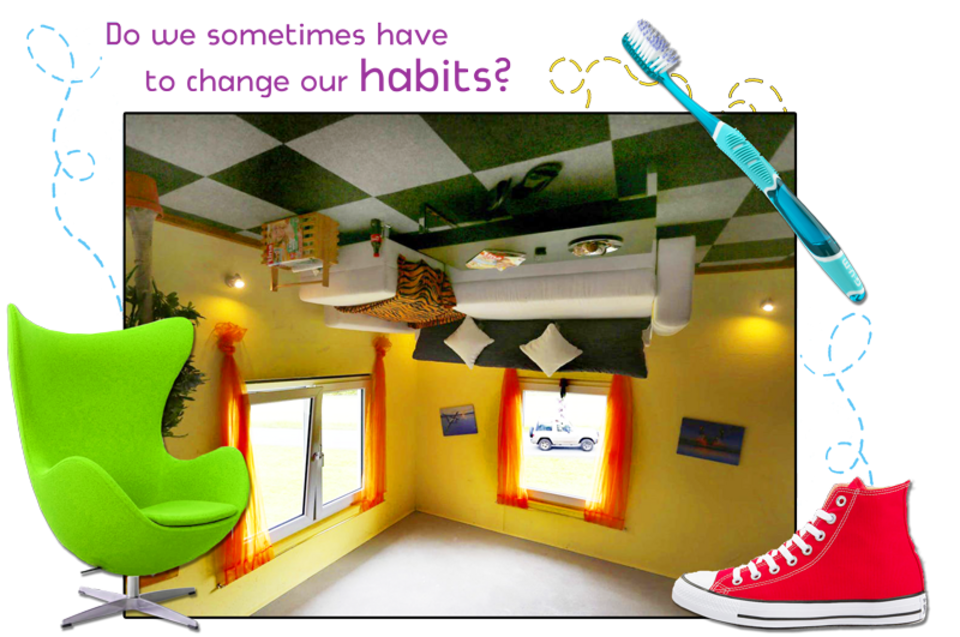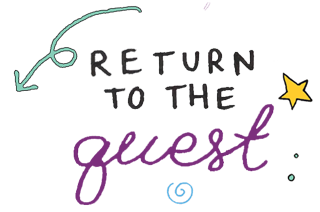
Shifting habits
| Objective: To play with the concept of habit by making a tiny change in a space! |
Duration: 15 to 45 minutes
Material:
- Your imagination
- Your space
Instructions:
Like it or not, we have ingrained habits: every day, we put our shoes in the same place, we sit down at the same spot at the table and we brush our teeth in the same way before going to sleep in the same bed. How about shaking up that routine a little by changing something in your environment?
...
- Choose a space. In this activity, your task will be to make a slight change to a space to see if it affects your lifestyle and that of your family. To do this, first go around your house to choose a space to change. Any place will do, as long as there is furniture or objects to be moved.
- Change the space. Look at the objects that fill the space. Think for a moment about what you and your family do with these objects. What could you move that would force you to slightly change the way you perform these actions? Then move something! It's up to you to decide whether you'd rather make a big change or a subtle modification that your family members will barely notice.
- Observe your behaviour. Next time you're in this space, observe the way you act. If you have the opportunity, also observe how other people act now that you have changed something in the space. Ask them: have they noticed that something is different? Has it changed the way they usually act?
- Think about habits. After making this change, think about these few questions: are habits necessary? Is it important to change our habits from time to time? Do our habits reflect who we are? Why or why not?
...
Bonus: "Art washes away from the soul the dust of everyday life." One way to understand this quote from Pablo Picasso is that art shakes up our habits of living and thinking. What do you think about this idea? Do you think that art helps us to become aware of our habits, or even to change them? Does art have to be something extraordinary that is separated from everyday life? Or can it instead be part of our everyday life? To think about these questions, create a mini artwork such as a drawing or a poem that you can display in your home to encourage your family members to become aware of their habits—or even to change them! |

| Tricks for tots: Has anyone ever told you that something you do is a "bad habit?" If you often leave your clothes on the floor or eat with your mouth open, for example. But it can be hard to change a bad habit! So to help you change a habit that you want to improve, try changing something in your environment. For example, you could put a chair next to your bed to make it easier to put your things down, or put a picture of a closed mouth—or even a small mirror—on the dinner table to help you to remember to close your mouth while you eat. Finally, ask yourself these questions: are we in control of our habits? Is growing up mostly a matter of changing your habits? Why or why not? |
| Tips for teens: According to sociologist and philosopher Pierre Bourdieu, we all have a "habitus"—a way of being, a set of habits or behaviours that guide our thoughts and actions. In his view, this habitus is shaped by the socio-economic group in which we are socialized: two children who grew up in wealthy and cultured families in two different cities are likely to have closer ways of thinking and acting than two children who grew up in the same city but from very different socio-economic backgrounds. Although often unconscious, habitus plays an important role in the possibilities and choices of individuals, according to Bourdieu. In particular, it underlies our interests (e.g., enjoying reading) and dispositions (e.g., having learned to express and defend our opinion): it therefore influences our possibilities and choices of career, partner, place of residence, etc. However, Bourdieu does not believe that habitus is set in stone: it can change over the course of our lives, depending on our experiences, and we can transform it by reflecting on how our socio-economic background has influenced our identity. Do you think your socio-economic background influences your interests and habits? Are our opportunities and choices determined by our socio-economic background? Maybe that is the case but only to some extent... Is it important to think about the socio-economic group we belong to? Why or why not? |
Share your creative reflections by sending them via email.
Include photos of your projects and notes of your thoughts, as well as your first name and your age!


